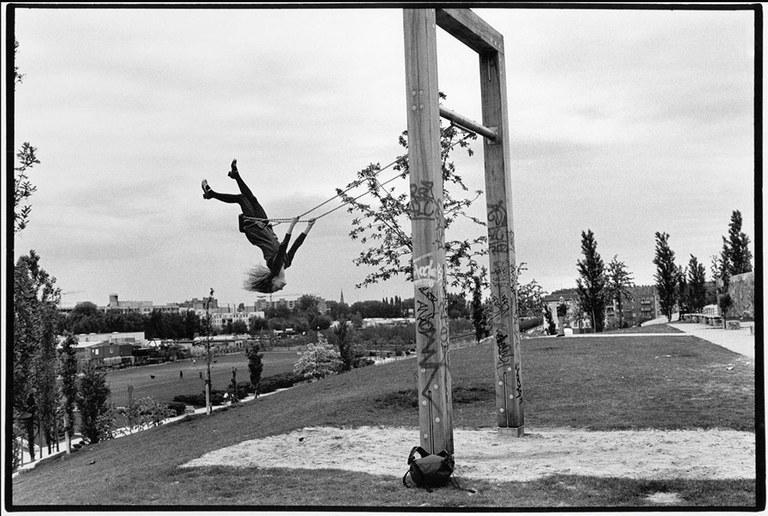Dr. Anne Pfautsch
Vita
Dr. Anne Pfautsch is an art historian and scholar specialising in (post-)socialist and feminist art. She is associate lecturer at the Kunstakademie Düsseldorf and the School of Art, Kingston University London. For her PhD thesis ’Ostkreuz Agency of Photographers: Tracing the Legacy of the German Democratic Republic in Post-Socialist Photography and Exhibition Making’, she received the Jutta Held-Prize 2023 from the Zentralinstitut für Kunstgeschichte. Anne also works as freelance curator; from 2022-23, she was curatorial fellow at Haus der Kunst München. From 2019-2021, she participated in the Getty Foundation’s Connecting Art Histories Programme entitled 'Gender Politics and the Art of European Socialist States‘, led by Prof. Dr. Agata Jakubowska. Anne writes for peer-reviewed journals, exhibition catalogues and feminist archives. Her research interests include photography, culture and gender politics in late and post- Soviet times, memory and identity, and decolonial, feminist, and Marxist methods in art history.
________________________
Anne Pfautsch über ihre mit dem Jutta-Held-Preis 2023 prämierte Dissertation „Ostkreuz – Agency of Photographers: Tracing the Legacy of the German Democratic Republic in Post-Socialist Photography and Exhibition Making":
 Emanating from the idea that forty years of socialist history, culture and socialisation did not vanish into thin air with the downfall of the German Democratic Republic (GDR), this thesis explores whether social and cultural identities associated with the former socialist state lingered on and how they continued to shape and affect photographic practices in post-Wall Germany. In particular, I focus on OSTKREUZ, a Berlin-based photographers’ agency whose foundation in 1990 served as a survival strategy in the tumultuous post-reunification period. The agency follows a twin-track approach of photographing for assignments and realising their individual photo-series, which are then presented in exhibitions. The period after the fall of the Berlin Wall was characterised by a lack of knowledge about and an enormous interest in the former GDR yet, the diverging political, social and economic developments had resulted in East Germany being constructed as ‘other’ from a West German perspective. Hailed as ‘experts of the East’ by West German magazines and newspapers, most of the commissions in reunified Germany took place in the East and the founding members were hired to portray their compatriots. Therefore, I investigate the question of whether the photographers had to adhere to or were able to counter a depiction of the former GDR as ‘other’ by discussing the agency’s commissions and assignments in the 1990s. To ascertain whether OSTKREUZ upholds East German social and cultural identities and whether they can be traced in their exhibitions, I examine their self-produced shows from 2005 until 2015.
Emanating from the idea that forty years of socialist history, culture and socialisation did not vanish into thin air with the downfall of the German Democratic Republic (GDR), this thesis explores whether social and cultural identities associated with the former socialist state lingered on and how they continued to shape and affect photographic practices in post-Wall Germany. In particular, I focus on OSTKREUZ, a Berlin-based photographers’ agency whose foundation in 1990 served as a survival strategy in the tumultuous post-reunification period. The agency follows a twin-track approach of photographing for assignments and realising their individual photo-series, which are then presented in exhibitions. The period after the fall of the Berlin Wall was characterised by a lack of knowledge about and an enormous interest in the former GDR yet, the diverging political, social and economic developments had resulted in East Germany being constructed as ‘other’ from a West German perspective. Hailed as ‘experts of the East’ by West German magazines and newspapers, most of the commissions in reunified Germany took place in the East and the founding members were hired to portray their compatriots. Therefore, I investigate the question of whether the photographers had to adhere to or were able to counter a depiction of the former GDR as ‘other’ by discussing the agency’s commissions and assignments in the 1990s. To ascertain whether OSTKREUZ upholds East German social and cultural identities and whether they can be traced in their exhibitions, I examine their self-produced shows from 2005 until 2015.
[Caption: Sibylle Bergemann, Mauerpark, Prenzlauer Berg, Berlin, 1996. © Sibylle Bergemann/OSTKREUZ]
